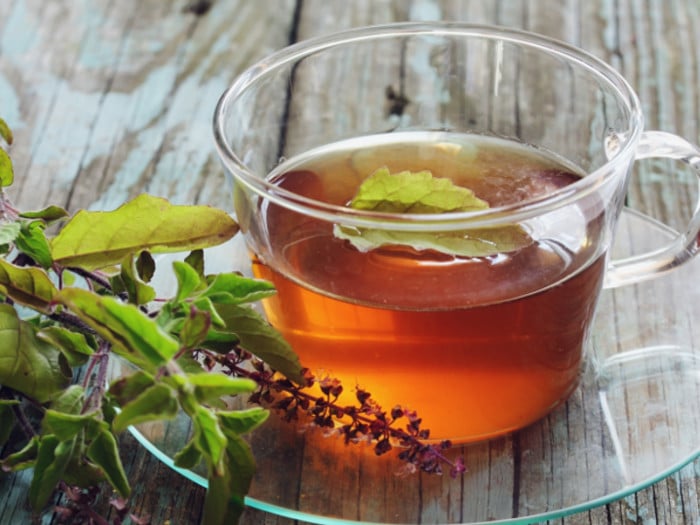Tulsi tea or holy basil tea has a wide range of health benefits that make it a popular beverage around the world. They include its ability to relieve stress, improve sleep patterns and regulate blood sugar. It also helps protect respiratory health, soothe inflammation, regulate digestion, and increase circulation.
What is Tulsi Tea (Holy Basil Tea)?
Tulsi tea is made from the leaves of the holy basil (tulsi) plant. Native to Southeast Asia and bearing the scientific name Ocimum tenuiflorum, [1]tulsi is the Sanskrit word for the holy basil plant. While not as sweet as the basil that many people use for cooking purposes, tulsi has an impressive variety of other uses in traditional medicine, including as a tea. The active ingredient, eugenol, in tulsi is a component that delivers major benefits. This tea is considered extremely healthy and has been an important part of Ayurvedic medicinal practice for thousands of years.
Benefits of Tulsi Tea
Tulsi tea has anti-inflammatory, antioxidant, digestive, stimulant, and stress-relieving properties, among others, which make it a very effective and popular beverage for those interested in natural healing.
Digestive Health
This Ayurvedic tea has a strong impact on the digestive tract and can stimulate the release of gastric juices, making the bowels move smoothly. Tulsi tea also has anti-spasmodic effects, which can help those suffering from constipation. It detoxifies the liver and bladder, reduces inflammation, and helps our intestinal flora find a healthy balance.
Respiratory Conditions
Tulsi tea is extremely reliable when you are suffering from a cold, cough or other illness that affects the respiratory system. The eugenol, camphene, and cineole found in this tea are potent antioxidants that also stimulate the expulsion of phlegm and mucus, where many pathogens can hide and develop. Furthermore, these antioxidants have strong anti-inflammatory, antiseptic, and antibacterial properties, helping you not only soothe the symptoms of the respiratory problem but also treat the underlying cause. [2]

Dried tulsi leaves can be steeped to create an invigorating herbal tea. Photo Credit: Shutterstock
Diabetes Control
The active ingredients in tulsi tea can stimulate the pancreas and reduce insulin resistance, while also lowering blood sugar in the body. This is particularly important for those at high risk of diabetes, or if they are already dealing with that disorder. Preventing the spikes and valleys of blood sugar fluctuation is a very important aspect of tulsi tea’s traditional use. [3]
Stress Relief
Eugenol, also known as clove oil, is the active ingredient in tulsi tea, and it is known to affect cortisol levels in the body. By managing and reducing the levels of stress hormones, this tea can help prevent the side effects of chronic stress such as increased oxidative stress, unbalanced metabolic activity, chronic disease, and a weakened immune system. [4]
Circulation
A cup of tulsi tea has a significant level of iron in it, which is an essential mineral within the body. Iron is a key component of red blood cells, which transport oxygen and nutrients throughout the body. By ensuring that you have enough iron in your diet, you can prevent the onset of anemia, speed up healing, increase energy, and ensure that all parts of your body get the resources they need. [5]
Sleep Issues
There are certain sedative properties to tulsi tea, which are important for people who cannot sleep regularly or are wrestling with sleep disorders. Very often, when your Circadian rhythms aren’t aligned, or when your body is experiencing chronic stress, sleep can be a challenge. This powerful tea can stabilize your metabolic pathways and eliminate that stress, allowing you to have restful, uninterrupted sleep.
Anti-inflammatory Properties
If you are suffering from arthritis, indigestion, headaches, fever, gout or any other inflammatory condition, tulsi tea can quickly relieve you of the discomfort. Drinking one cup at the beginning and end of the day can provide relief from different ailments, as well as chronic pain and joint disorders. [6]
Tulsi Tea Side Effects
Tulsi tea does have some unexpected side effects. It leads to blood thinning, affects hormones and fertility, interacts with other drugs, and lowers blood sugar levels to a dangerous level. These side effects must be taken into consideration before adding tulsi tea to your health regimen.
- Fertility: There is some concern that the use of tulsi tea can impact fertility in males, namely because regular use appears to lower sperm count levels in laboratory tests. This isn’t widely reported anecdotally, but for men who are already struggling with fertility issues, this may not be the best choice for a beverage.
- Eugenol Overdose: Eugenol is the active ingredient in tulsi that gives the tea so much of a potent health boost, but consuming too much eugenol can also be dangerous, and in excessive amounts, it can cause shortness of breath, blood in the urine, nausea, dizziness, and coughing up blood. 3-5 drops of eugenol per day are the recommended dose, as it is very concentrated and powerful. [7]
- Blood Sugar: The ability of tulsi tea to lower and balance blood sugar levels is great for people at risk of diabetes or suffering from the condition, but an excessively low blood sugar level or hypoglycemia is dangerous. Diabetics should speak with a doctor before adding this tea to their diet. [8]
- Blood Thinner: If you are scheduled for surgery, you should stop taking this natural blood thinner 1-2 weeks before the procedure, to avoid any possible complications. [9]
- Drug Interactions: Research has shown that interactions between Tulsi and traditional prescriptions happen quite often, and can be potentially dangerous.
Speaking to a doctor is highly recommended before adding tulsi tea to your diet.
